Why Compost? Learn the easy process of composting step by step. Also all about Composting from a using a kitchen scrap collector to turning the compost. And then utilizing the compost for vegetables and mulch.
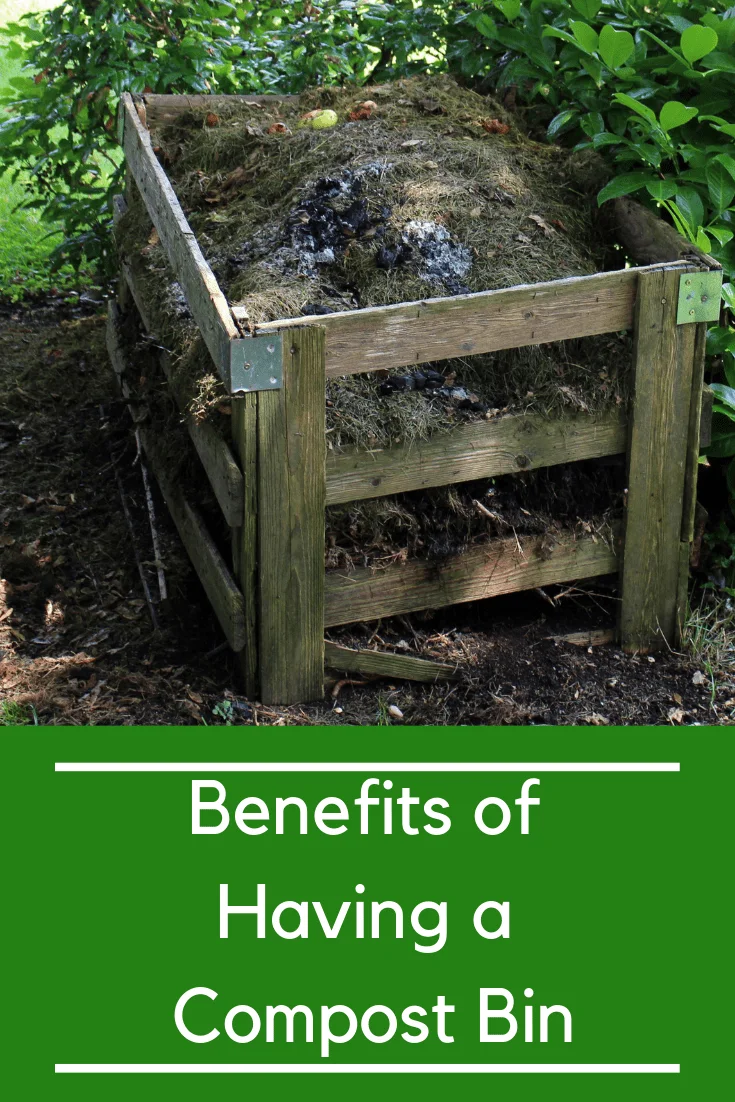
Having your own compost bin helps you have control over the nutrients going into your garden. Being mindful of the items going into your compost allows you to know what is going into your garden.
This post contains affiliate links which means if you make a purchase we might receive a small commission at no additional cost to you.
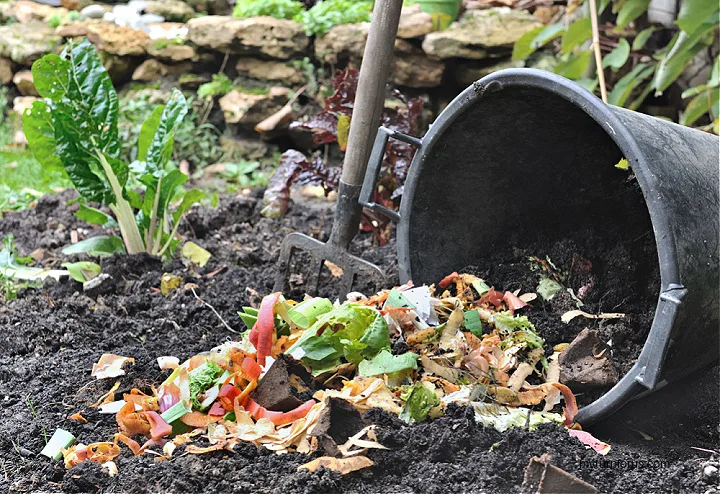
Conventional store bought compost and fertilizers often contain non-organic matter and chemicals that goes into your garden. Making your own compost is the best way to ensure your garden gets the best. If you chose organic gardening you will benefit from knowing exactly what is going into your garden.
Why compost:
Having your own compost is a great way to reduce waste and help your garden grow and thrive at the same time. This is a great way to keep your home smelling nice by keeping smelly food scraps out of your kitchen garbage can when you regularly move them to your compost bin.
How Does Composting Help the Environment:
- A compost bin is a great way to reduce waste from your home going into landfills. Many paper products that can not be recycled can be used to create compost. Most of the waste that makes it into landfills is actually food waste often from our own kitchens. It doesn’t take much to have a kitchen scrap collector on standby to prevent this.
- Having a compost bin is a great way to do your part in helping improve our environment. Composting reduces greenhouse gasses that develop when items sit in a landfill. The process of composting helps break down chemical compounds often purifying during the compost process.
- When the compost reaches your garden it is fresh and clean helping to improve overall soil quality.
Compost is Good For the Garden:
- Having a compost bin is a great way to help your garden thrive. The benefits for your garden, family, and the environment means composting is worth the low cost investment.
- Composting helps you provide your garden with the fuel it needs to grow strong while saving you money on your garden. Quality compost is great for helping your garden thrive.
- Your nutrient-rich compost will feed your plants better than any fertilizer you can find at the local lawn and garden department. A compost bin turns everything you toss into it into food and compost mulch for your garden.
- Small twigs and other bits that do not fully break down before you place your compost into your garden will add organic matter to your soil allowing it to help improve your soil’s drainage.
- Be sure to save liquids coming from your compost bin. These fluids are packed with nutrients that helps your garden grow and costs much less than liquid fertilizers.
Composting Saves Money:
- Turning your home waste into compost is a great way to save money on your garden. Buying compost and other fertilizers can be costly and the cost adds up over time.
- A compost bin will often pay for itself in one or two gardening seasons when you no longer have to spend money on additions to your home garden to provide nutrients.
- To get the most of your compost bin, look for an affordable option or make your own using a rubber tote with a lid.
Why is composting important
- Quality compost is great for helping your garden thrive but can be expensive to purchase
- Your nutrient-rich compost will feed your plants better than any fertilizer you can find at the local lawn and garden department. A compost bin turns everything you toss into it into food for your garden.
- Composting is easy and can be a fun way to teach children about how things break down over time. And at the same time teaches them to recycle and help the environment.
Different composting methods:
Composting is the breaking down or decomposing organic solid wastes into a hummus-like material known as compost. There are three common methods to compost at home.
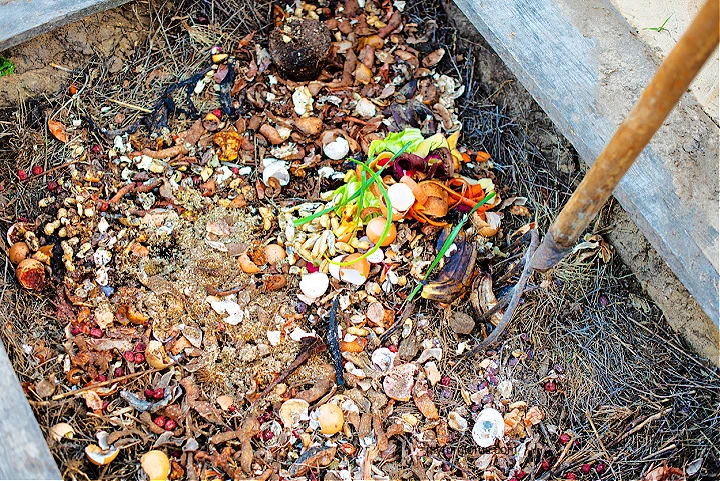
- Aerobic composting: Aerobic composting requires the introduction of oxygen to compost piles by either manually turning the compose or to spin it in a tumbler. You will need to turn it every few days to keep it aerated. Add plenty of green matter that contains lots of nitrogen, such as grass clippings and kitchen scraps. As everything breaks down the temperature of the compost will get higher. This speeds the process. Also, moisture may need to be added from a hose or watering can.
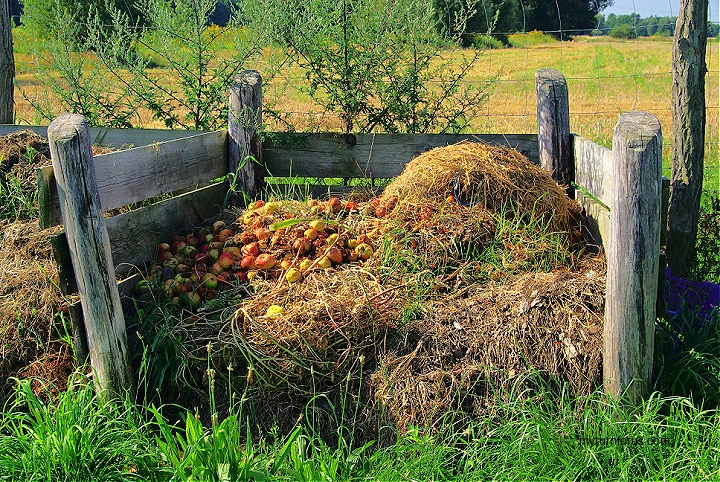
- Anaerobic Composting: Anaerobic composting takes almost no effort at all. Just chuck scraps and yard debris into a compost pile, moisten it and cover it with a tarp for a year or more. This deprives it of oxygen and is essentially putrefaction and it will smell.
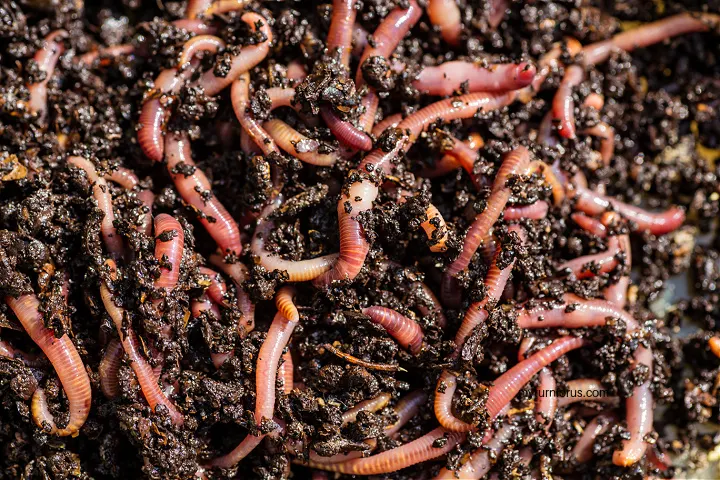
- Vermicomposting: uses worms, oxygen and moisture to safety break down organic material. It’s the product of earthworm digestion and aerobic decompositions using the activities of worms and bacteria. Worms are doing all your work of turning the compost. Red worms are favorites for this type of composting. Vermicomposting, or worm composting, produces a rich organic soil amendment containing a diversity of plant nutrients and beneficial microorganisms.
Process of composting step by step
- Choose or Build your Compost Bin- Use an open pile or a compost bin. Bins have the advantage of keeping everything contained and preserving heat. If you choose a rotating bin, then it makes it simple to turn the compost every few days. Also a plastic drum bin will keep animals out. You can purchase these from a farm or garden store. I suggest you have more than one. One that you are filling and the other that is ready and you are using compost out of it.
- Choose the location- This will depend on the type of compost bin you have. A sunny location is a must to generate enough heat to break everything down. If you have a chosen Anaerobic composting it shouldin a location that the smells do not bother you or others. If its a drum than it can be placed close to your garden or home for easy of filling.
- Filling the Bin- You need to keep in mind that composting is a balance of dry or brown things and wet or green things. (see the list below)

The Right Balance for your Compost for vegetables and garden
Having a compost pile is a great way to help boost the nutrients in your gardens soil. With compost you can enrich your soil to help your plants grow taller and stronger than soil alone. The key to having a rich compost is making certain you have a wide variety of ingredients.
When you look over this list of things you should be composting but aren’t, keep in mind that each person is different. Some of these ideas may be more than you are personally comfortable with. If so, that is perfectly fine. Take what you can from this list and skip the ones that you may be uncomfortable with. After all, it is your compost pile.
dry
An efficient compost pile is a careful balance of dry or brown things that contain carbon (like dry leaves, straw, or paper) and wet or green things that contain nitrogen (like food scraps).
Dry or Brown things that contain carbon:
- Cardboard shipping boxes
- Dry Leaves
- Egg Shells
- Paper scraps
- Shredded paper
- Paper towels or tissues
- Coffee Grounds and the coffee filter
- Tea leaves or tea bags
- Wood Scraps
- Soil from potted plants
- Soil from turning garden beds
- Fireplace ash
- Dead plants or flowers, plant cuttings and weeds with the roots removed
- Small trimmings from trees
Wet or Green things that contain nitrogen:
- Kitchen scraps
- Fruit or Vegetable scraps
- Melon Rinds
- Banana Peels
- Garden trimmings
- Grass Clippings
- Fresh Leaves
- Live Christmas trees, wreaths or garland after the holidays – Be sure to break these items down before composting.
- Rotten Vegetables
- Your Halloween Pumpkin
- Moldy bread – Be sure to bury these to keep unwanted pests away
- Cuttings from trimming plants or bushes
- farm animal manure (avoid dog or cat feces)
Kitchen Scrap Collector:
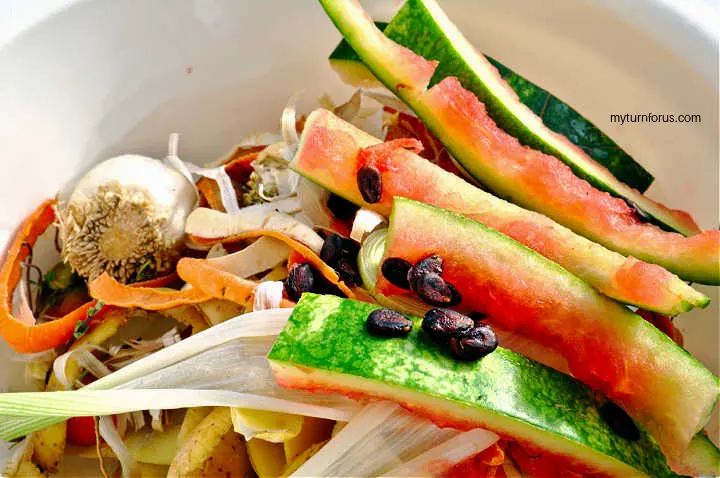
When you decide to start composting you will need some sort of kitchen scrap collector. You could simply use a plastic bowl and take it out to the bin as it fills up. But if is not emptied immediately it can draw gnats and it can smell. We use a small kitchen scrap collector tin which we purchased.
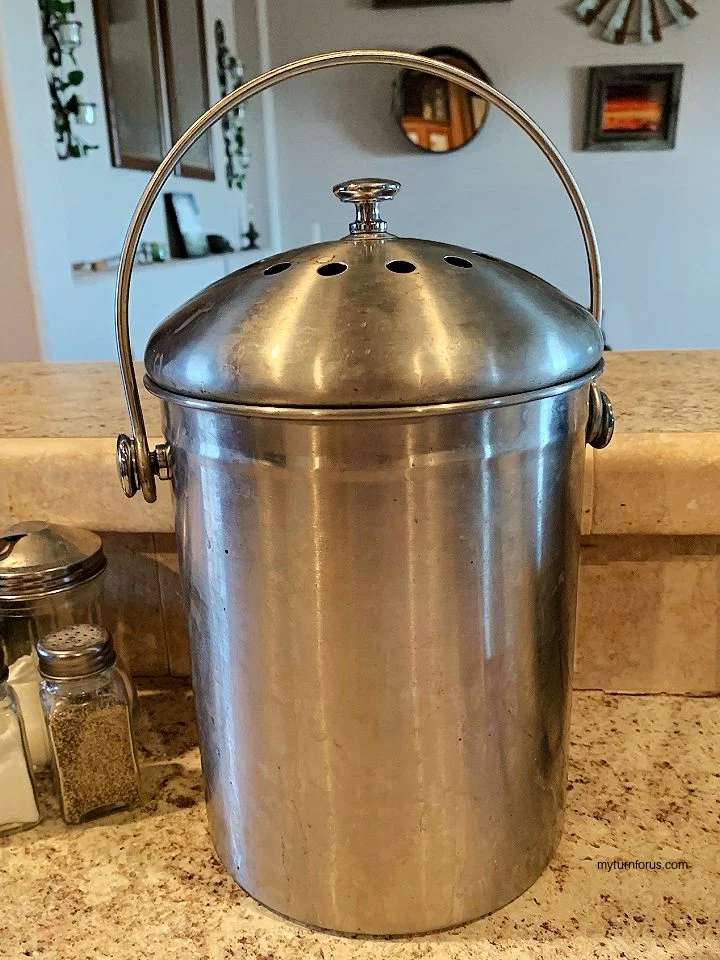
This kitchen scrap collector or little compost bin has an airtight lid and an activated-charcoal filter to control odor. It’s pretty enough to sit on your counter but we keep ours under the kitchen sink. You can use small plastic trash bag or these compostable bags which are eco friendly. These compostable bags are made from plant starches and contain NO polyethylene.
How to turn a compost bin:
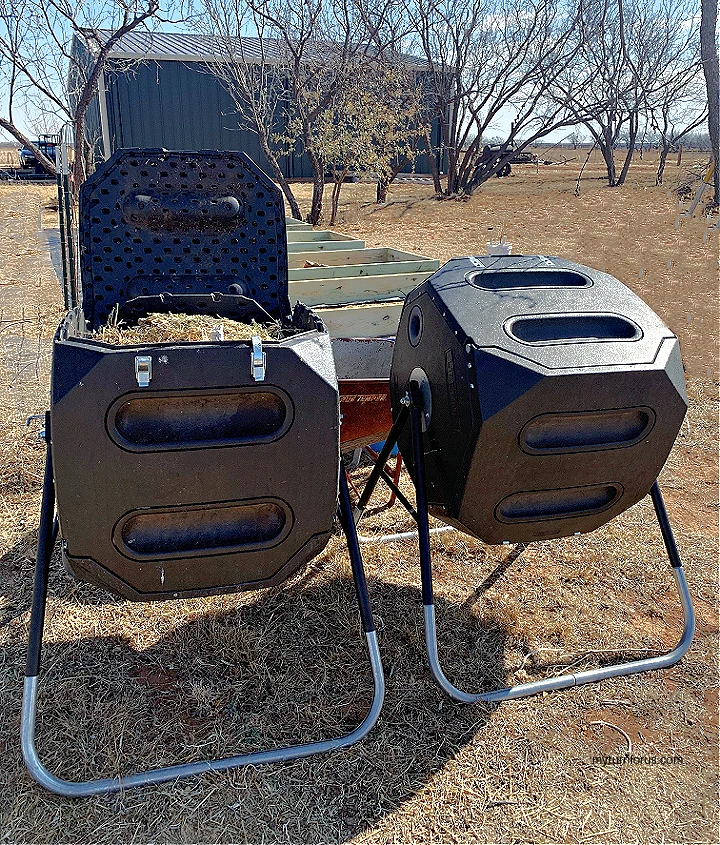
- Of course the easy way of turning a compost bin is to purchase one or more of these Compost Tumblers. These have a large opening for loading and even more importantly, they are easy to unload. (In the past we purchased a rotating composter but when it came time to emptying it, it was almost impossible without scooping it out with your hands. YUCK!). So we donated that one and we purchased both of these Compost Tumblers which are so easy to load and unload. We fill one and give it time to do it’s thing as we fill the other. And we rotate them often spinning the entire drum. Super easy to turn this compost bin!
*TIP: Remember make sure whatever compost tumbler you purchase is EASY to unload
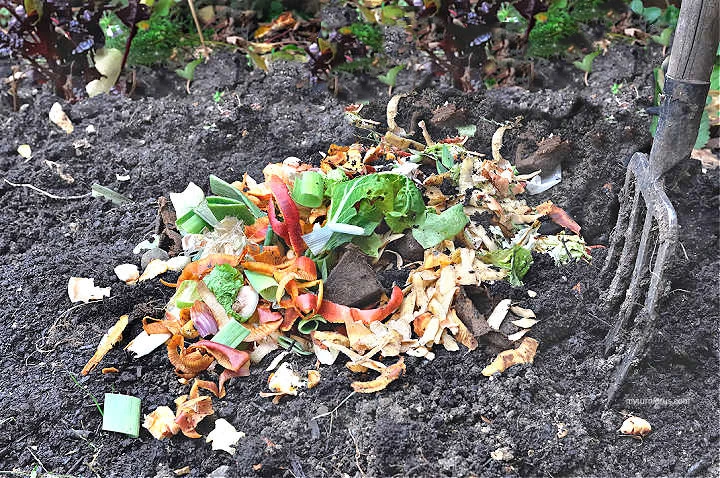
- An open compost bin needs to be turned often for faster results. To turn this bin, insert your shovel or a pitchfork into the pile and lift it up and flip it. Some gardeners choose to have two or three compost bins and they move the compost from one bin to another. This insures that what was on top is now on bottom and so forth and mixes it very well.
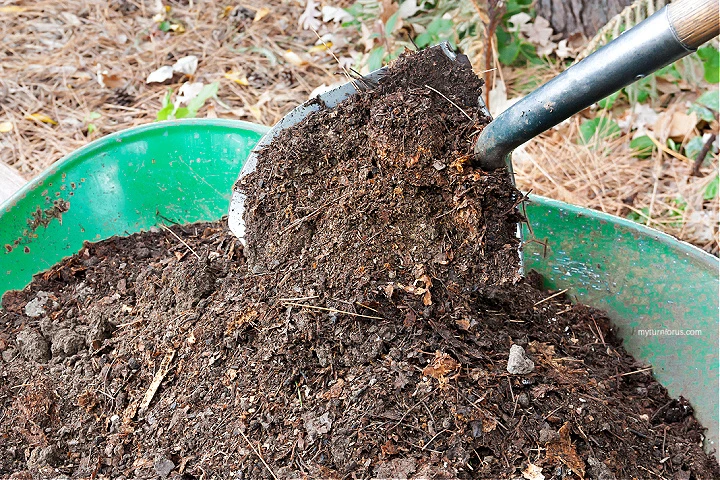
By following these tips on home composting you can have the satisfaction of turning kitchen scraps and yard clippings into rich food for your vegetable and flower beds in your backyard
Other Garden and Backyard Tips and Helps:
- G10 of the Most Useful Tools for Gardening
- 23 of the Best Backyard and Garden Ideas
- Free Garden Printable
- Indoor Herb Garden
In Conclusion the Process of Composting Step by Step
- Determine which method works for you
- Build or Purchase your Bin
- Choose your location
- Fill your bin with the right balance
- Turn your compost
- Enrich your garden with clean healthy compost
Click HERE to save this to Pinterest

